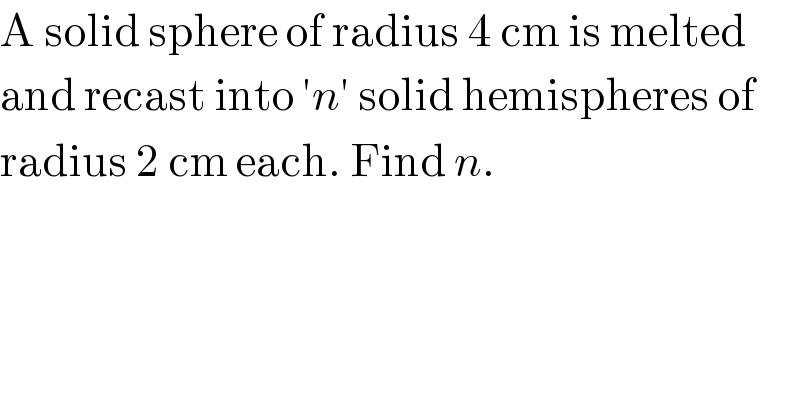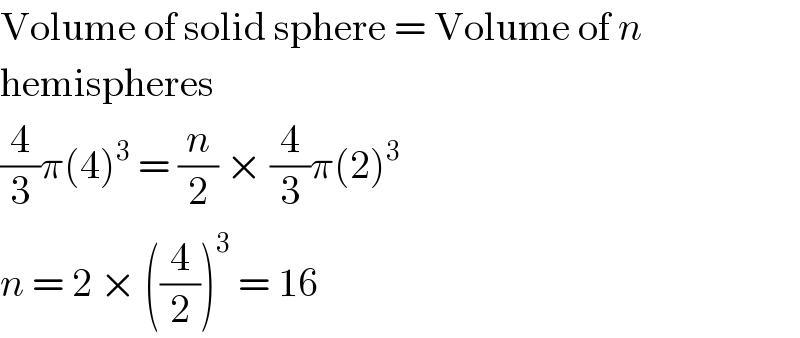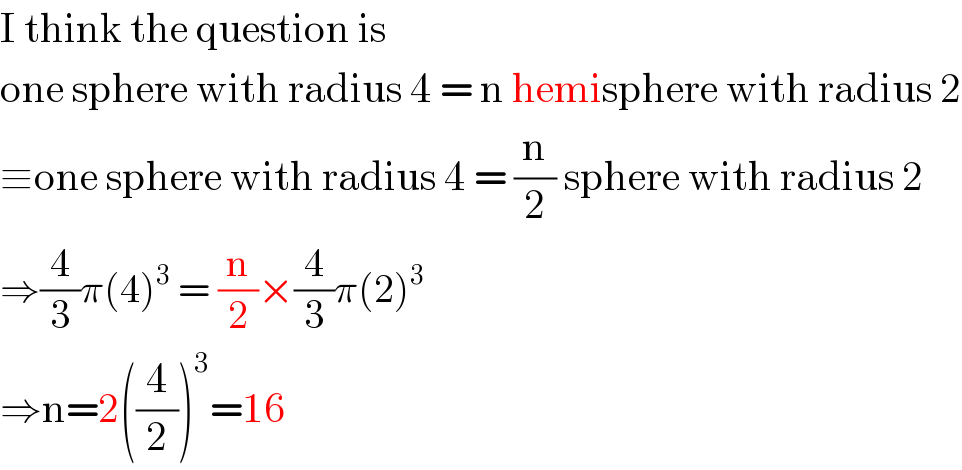
Question Number 16418 by Mr easymsn last updated on 21/Jun/17

$$\mathrm{A}\:\mathrm{solid}\:\mathrm{sphere}\:\mathrm{of}\:\mathrm{radius}\:\mathrm{4}\:\mathrm{cm}\:\mathrm{is}\:\mathrm{melted} \\ $$$$\mathrm{and}\:\mathrm{recast}\:\mathrm{into}\:'{n}'\:\mathrm{solid}\:\mathrm{hemispheres}\:\mathrm{of} \\ $$$$\mathrm{radius}\:\mathrm{2}\:\mathrm{cm}\:\mathrm{each}.\:\mathrm{Find}\:{n}. \\ $$
Answered by Tinkutara last updated on 22/Jun/17

$$\mathrm{Volume}\:\mathrm{of}\:\mathrm{solid}\:\mathrm{sphere}\:=\:\mathrm{Volume}\:\mathrm{of}\:{n} \\ $$$$\mathrm{hemispheres} \\ $$$$\frac{\mathrm{4}}{\mathrm{3}}\pi\left(\mathrm{4}\right)^{\mathrm{3}} \:=\:\frac{{n}}{\mathrm{2}}\:×\:\frac{\mathrm{4}}{\mathrm{3}}\pi\left(\mathrm{2}\right)^{\mathrm{3}} \\ $$$${n}\:=\:\mathrm{2}\:×\:\left(\frac{\mathrm{4}}{\mathrm{2}}\right)^{\mathrm{3}} \:=\:\mathrm{16} \\ $$
Commented by mrW1 last updated on 22/Jun/17

$$\mathrm{I}\:\mathrm{think}\:\mathrm{the}\:\mathrm{question}\:\mathrm{is} \\ $$$$\mathrm{one}\:\mathrm{sphere}\:\mathrm{with}\:\mathrm{radius}\:\mathrm{4}\:=\:\mathrm{n}\:\mathrm{hemisphere}\:\mathrm{with}\:\mathrm{radius}\:\mathrm{2} \\ $$$$\equiv\mathrm{one}\:\mathrm{sphere}\:\mathrm{with}\:\mathrm{radius}\:\mathrm{4}\:=\:\frac{\mathrm{n}}{\mathrm{2}}\:\mathrm{sphere}\:\mathrm{with}\:\mathrm{radius}\:\mathrm{2} \\ $$$$\Rightarrow\frac{\mathrm{4}}{\mathrm{3}}\pi\left(\mathrm{4}\right)^{\mathrm{3}} \:=\:\frac{\mathrm{n}}{\mathrm{2}}×\frac{\mathrm{4}}{\mathrm{3}}\pi\left(\mathrm{2}\right)^{\mathrm{3}} \\ $$$$\Rightarrow\mathrm{n}=\mathrm{2}\left(\frac{\mathrm{4}}{\mathrm{2}}\right)^{\mathrm{3}} =\mathrm{16} \\ $$
Commented by Tinkutara last updated on 22/Jun/17

$$\mathrm{Thanks}\:\mathrm{Sir}!\:\mathrm{It}\:\mathrm{is}\:\mathrm{now}\:\mathrm{corrected}. \\ $$
